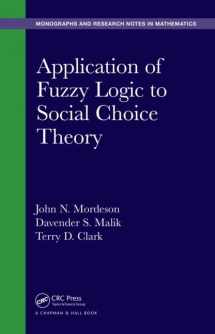
Application of Fuzzy Logic to Social Choice Theory (Monographs and Research Notes in Mathematics)
Book details
Summary
Description
Fuzzy social choice theory is useful for modeling the uncertainty and imprecision prevalent in social life yet it has been scarcely applied and studied in the social sciences. Filling this gap, Application of Fuzzy Logic to Social Choice Theory provides a comprehensive study of fuzzy social choice theory.
The book explains the concept of a fuzzy maximal subset of a set of alternatives, fuzzy choice functions, the factorization of a fuzzy preference relation into the "union" (conorm) of a strict fuzzy relation and an indifference operator, fuzzy non-Arrowian results, fuzzy versions of Arrow’s theorem, and Black’s median voter theorem for fuzzy preferences. It examines how unambiguous and exact choices are generated by fuzzy preferences and whether exact choices induced by fuzzy preferences satisfy certain plausible rationality relations. The authors also extend known Arrowian results involving fuzzy set theory to results involving intuitionistic fuzzy sets as well as the Gibbard–Satterthwaite theorem to the case of fuzzy weak preference relations. The final chapter discusses Georgescu’s degree of similarity of two fuzzy choice functions.


We would LOVE it if you could help us and other readers by reviewing the book
Book review



